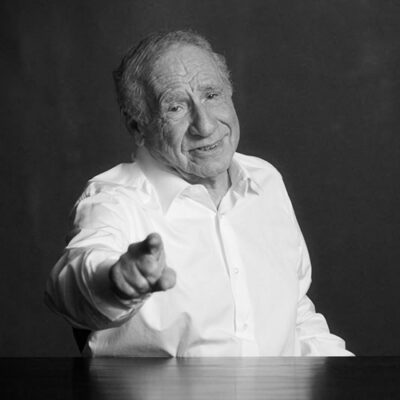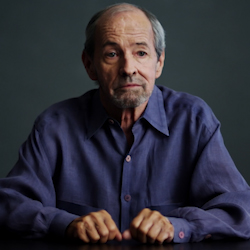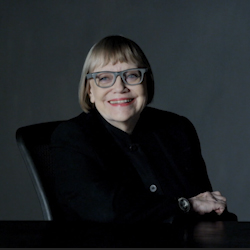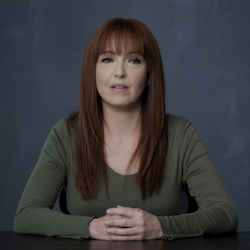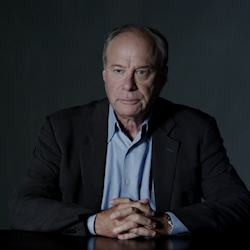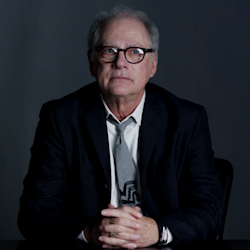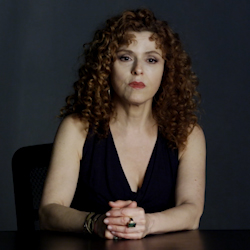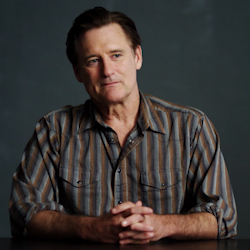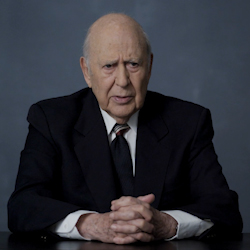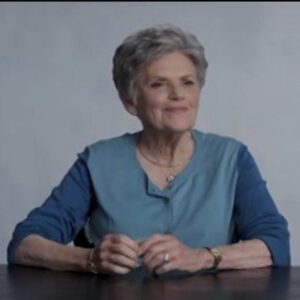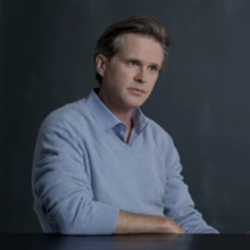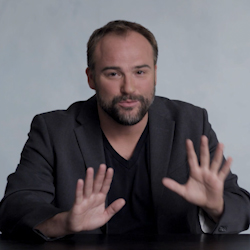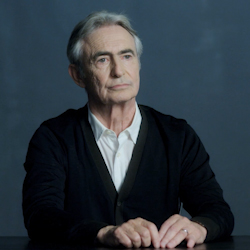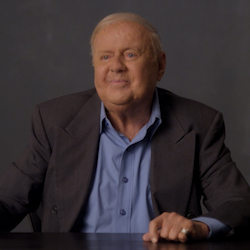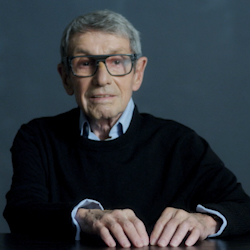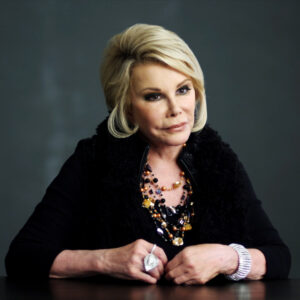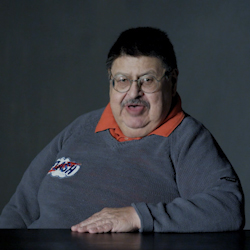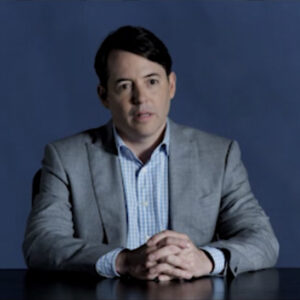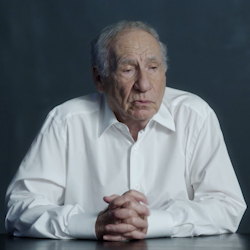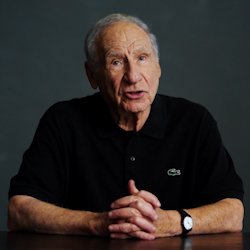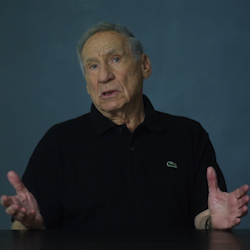Interviewer: All right. So tell me what what you just told me that you were talking about high anxiety and I asked you where you had gotten the accent from and you said that. You asked him you asked Mel how he wanted you to play it voice wise. So he posed as a, you know, give it back to me.
Cloris Leachman: Well, it started in my trailer, what do you call it? And I’d been made up and I had my costume, I was all ready to go and there was a black pencil in my hand. I just put on some eyebrows a little too close together and curled. And just waiting there. And I started a fence along a little. Turned out to be a mustache. A Chloris. Enter. Come on. OK. Like, tore up and I was down there. Gotten a set and m.. I said, Mel, how do you want me to play this? And he said, well, he put his hands down into. I said, well, I did that already. He said when I said Young Frankenstein. Oh, well, how do you want to do it? I said, well, I don’t know. But I don’t want anybody to recognize me. I’m so evil in this that I. I was thinking I. And I think most people might know me from my smile or my teeth on the Mary Tyler Moore Show. And so I just keep my mouth covered and, you know, talk. I had no idea what I’d done. I later I figured I was sort of a combination of Ed Sullivan. And this. Woman who started the actress studio, Cheryl Crawford, and a short ended up like this. I didn’t. He said, You want to be that crazy, I should. And just then everybody showed up. We started working and nobody ever thought about it again. And I had to keep matching my mustache. That’s how that happened.
Interviewer: And tell us also, you you were also telling me earlier you showed up at Fox in the wardrobe department. They had built the costume that fit you. But then just to refresh you, you told them that at the hump in the neck that you didn’t want a neck. So just tell us that story.
Cloris Leachman: Well, I had an appointment to to try and my costume at 20th. So I drove up there, parked, went into my room and lovely large room and mirrors and the designer and the other several women to help. All right. About five people, women. And they brought my customers. Perfect fit. Exactly right. All these big protuberances built in completely perfect, zipped it up. And there I was. And I looked at myself in the mirror and I. I thought I looked like a young. Oh, a young. They are big. I’m not Emo’s, not Emo’s ostriches. I look like a young just out of the egg ostrich.
Interviewer: Let me get you started again so that you can get it. OK.
Cloris Leachman: From the very beginning. Well, I was called to try and my costume. So I drove over to Fox parked, went into lovely, large, lovely dressing room and the designer and about four other seamstresses arrived. And they were on their knees and hands, hands and knees and all at the ready. I put on my costume was perfect. It zipped it up and I. It fit me exactly, but I thought, what’s what’s wrong here? And I thought, well, these are sticking up so far. I think we should balance it maybe back, put a little padding in my back. So they put that in exhibit. Yeah, that’s good. Now my shoulders need to be a little higher. Well, they put it right here and it didn’t work, so they took that out and we’ll put it in here. So they did. And it kept building hired. I wanted to have a short neck. I keep thinking of it as middle European. But anyway, that’s what did I do to myself. And it worked. So now, like an extra. And my back’s bigger and my tits are very protruding. And it was perfect. Then I went to the wig department and had this big black wig all built it. It came down to my knees. And we wandered around and put it up, put a pin in it. And my cap was perfect. So anyway, Harvey arrived and we were off to the races. We started shooting right away. And that’s the end of that.
Interviewer: Did. now, when you were doing Young Frankenstein, you said that that you didn’t really you had never done the accent.
Cloris Leachman: I was. I arrived. I was made up, put on my costume, went down there. I had a in about 10, 11 minutes, and they were working right near me and. I’ve never done it. Could you help me? Everybody. Anybody? Anybody? Anybody trying to work? Well, Mel’s mother was there that day and she helped me. And I remember saying I, I said my first line very slowly because I didn’t wasn’t quite comfortable with it yet. I am for all blue. Years later. So a few years ago, Mel told me that Blocher in Yiddish means glue. All the forces were all going afraid they were going to be sent to the glue factory.
Interviewer: The. Was there? You’re saying everything’s was with him? Everything was on the page or there was room for improper? No.
Cloris Leachman: I wouldn’t even call it in private. There was the script, which we we never deviated from the script. And so you you know, all your life. And then he would set up a scene. Gene, you stand there in class. You’ve done it. Excuse me. And so we take our spot. We had learned our life. You wanna grab some more? Let’s coming in here. This is my best side. My only good side. Oh, okay.
Interviewer: Yeah, you’re get. So you’re saying you’re you’re saying it’s not so much a question of improv as.
Cloris Leachman: Well, we have learned our lines and now, Mel. It’s a scene. Mel said, you stand there, Gina and Cloris, you stand there and then he goes back by the camera somewhere and we can’t see him end up. We start to see in action. And I said. Would you care for a brandy, perhaps before retiring, he said. And Jean didn’t say no thank you. He said, no, thank you. Oh, well, I hope to never say good night. Good night. Threw me a little bit. So that’s why my for my performance is what it is. I’m reacting to Jeanne and every single thing I did at all. He exactly imitated. It was like a Rorschach test, I’d say. Overdone, I would say. Good night. Good night. And I’d turn, he’d turn, we’d walk, I’d take a few steps, like turn back, turn back. Back a few steps. For milk. No, thank you. Over to you, and I think Jeanne made it funny, he just it’s funny, the words are funny, but. It has a little extra. Oh, I didn’t expect you to say that.
Interviewer: It is it rare that you get on a set and that.
Cloris Leachman: Is it what?
Interviewer: Is it rare to be on a set where they let you fly like that to, you know, take the character so far in any direction you think best?
Cloris Leachman: Never daring happens.
Interviewer: So I should say they never it never happens. I never get that much whatever you want to say, leeway on a SAT or something.
Cloris Leachman: When I come on, it’s set, we. I’d say, what would you like in the says or where should I be? Or there? And. And we just start. And sometimes I’ll have five or six suggestions. I call and reject ideas. I have several reject ideas and I’ll name them and maybe they’ll say no to everything or yes to wonder. Try this. So it’s always just kind of quick and trying something. It’s trying something out. Lots of times I have. I just not that’s a reject idea. But that’s how you get more and more specific. And gosh, you just have to believe that you have to believe in yourself and what your opinion is and what you need or want a better good. You can’t judge it except that you think you’re right or you wouldn’t be doing it this way. I don’t mean as an actor. I mean your character. And in my case, with a nurse, Diesel. Well, are Young Frankenstein, I mean, Young Frankenstein. I lived in that castle, it became my castle. So one of the lines that was, oh, he had to cut up twenty five hours of extra foot shooting. Everybody was really funny. I Gore.
Interviewer: Marty Feldman.
Cloris Leachman: And Marty Feldman. When.
Interviewer: The keys are the keys, are you talking about? Keith, the BR goes the fur. When he bites the fur on that one, call you Madeline.
Cloris Leachman: Madeline Kahn arrives. Toward the end of the picture. And she’s dressed in a big white box fur and I gore. Igor goes over to each of the act that will watch it with his mouth. It was hysterical. But of course, it was cut out because it was just too long. Mel had hours and hours of extra footage. All of it precious. All of it funny. We had another scene that was cut up just short. I’m introducing Dr. Frankenstein Stone to the castle. And I say on this ring are the keys to all the rooms in. On this ring are the keys to all the rooms in your cars or in every head? I whereas the laboratory I say is a laboratory. You know, that was just little things like that. We try.
Interviewer: But Bijur saying again. Well, how much? That usually not allowed that much freedom. I said that while you were you started to say by directors like to run with a character that way.
Cloris Leachman: Well, you can run down the wrong track. You need to get on the right track and you’re on the right track. Whatever happens kind of works.
Interviewer: Is there a.. As fun as it is and as funny as the script is, it ticks. I would imagine a good amount of discipline on your part to. Focus. Not you not trying to play it funny. You’re playing it.
Cloris Leachman: Absolutely. Absolutely. Jeanne was hopeless. I mean, Iceland to kill him, hit him, swat him, slap him, kick him in the neck. He was, I’d say. Oh, I see. Or something. What about the candles, honest? Does it stay close? Stay close to the candles. The staircase can be treacherous and he’d have two pieces of his face. They were separate. He was laughing, just helpless. So we do it again. Stay close to the candles. The step. Again, we did about fifteen done. And finally. Mel came up to me and he whispered in my ear, and then I said the line this way. Stay close to the candles. The staircase can be treacherous. I mean, we have lost a couple of people, and that’s, I think, the only nobody ever gave me.
Interviewer: Tell us that one more time, because you had a gap in the beginning. Tell us the very beginning of it. Tell us. So we have it clean. Starting with what? Starting with you. You want to killed Gene because he was laughing.
Cloris Leachman: Gee, we. I didn’t have to have any discipline, it was Gene who can control himself and, you know, he wrote it with mail. He wrote it first. And he and Mel then wrote rewrote it again. My biggest frustration then they either cannot remember or will not. Tell me who wrote which line? Some of them you really want to know. Did you do this or did you do just to know each person better?
Interviewer: The thing about the treacherous, that Gene wouldn’t stop laughing with the candles. Just tell his story. Yeah.
Cloris Leachman: We were going up the stairs. And I have this candelabra with candles that are not lit and I say stay close to the curtain. He’s behind me. Stay close to the candles. The staircase can be treacherous. And he had two pieces of his face. He was laughing. It broke into two pieces. So we do it again. And we did it 15 times. And the 15th take I said, stay close to the candles. The staircase can be treacherous. Mel Brooks ran up and he whispered in my ear. Went back. Action. Stay close to the candles. The staircase can be treacherous. He had me raised it because we’ve lost a couple of people stairway. There is no there’s no railing. And I think that’s the only note he ever gave me.
Interviewer: The the thing with Mel’s comedy is that I’ve been noticing is it’s not situational, it’s not at all situational, it’s character driven. If you you could say it’s character driven comedy.
Cloris Leachman: And so you say that I don’t say.
Interviewer: It’s character driven comedy, but it also is a slightly surreal in a way. Right.
Cloris Leachman: Yeah. I mean, I, I own that Cashel I had, you know, my lover had been. The Senior Frankenstein St..
Interviewer: I’m just trying to figure it’s a guy. His voice is such a unique. Comic voice mells, you know. How would you describe it?
Cloris Leachman: He’s brilliant. He’s absolutely a real warm darling. I called as two Jewish mothers. I’m not Jewish, but we after lunch in the commissary every day. He and I ended up being the only people there who were cleaning up. We’re cleaning up all these tables. And I just thought were two issues. He’s a darling guy. I pretend we’re married sometimes just to myself.
Interviewer: He said and this may not be true, but he said when we talked him on Monday when he was rhapsodizing about you, he said that on Young Frankenstein that. He said that I at lunch at the commissary, when your work fell off and it fell into your tuna and you eat it.
Cloris Leachman: No, I was being made up. Makeup. And I was eating my eggs. Mike Moore, I had a bigger moment in three pictures I did with him each. The mole got bigger in three different characters and it was a good one of the good hair and good stiff old Chinese man hair. Well, all of a sudden, it wasn’t there. And, oh, you know, putting down the things and looking and looking and looking at. We pulled back the chair and we looked under and put on the lights and it wasn’t there. I looked for it later. And the bathroom several days. Never found it. So that’s one more word.
Interviewer: So you had it? Yeah, it was on my face. You just tell us who grabbed that line that it had fallen into. My breakfast is on.
Cloris Leachman: The line. It had fallen into my.
Interviewer: Yeah.
Cloris Leachman: Well, I don’t know what happened. I was eating some scrambled eggs and and suddenly them all was missing and and they it was I ate the rest of the eggs. But we never found it.
Interviewer: Do you remember when you first met?
Cloris Leachman: Well, I was doing a. Andy Williams. He had a series each week. And I was doing a sketch with Tony Randall of a man whose wife was pregnant, I was pregnant and I don’t know what happened. But the writer came on to the set because Tony was saying that I was stealing the scene in a loving, jovial way. He wasn’t mattering. And well, I’ve had so many children, I’ve. I know about labor very well. And I would be serious. You know, I’m just doing it. So anyway, it turned out to be Mel Brooks, who was the writer of that sketch. And we had a wonderful little time there. Later, I think he asked me for a date and I was already going with my to be husband, George. And so I didn’t go out with him. And then he married. And Mano, who became an. Bankrupt. So I’ve always. She and I were two hot young things in New York when we first went there, we were getting all the parts in like television. Little seven inch screen. And so I didn’t know n but I admired her always. Please pick up your feet when you’re walking over there. She didn’t hear me. She did.
Interviewer: We have to reload anyhow.
Cloris Leachman: After reload.
Interviewer: For a mirror of young Broadway. Young Frankenstein. No way. And he said something about somebody asked about you. And he said, you know, I try to see her every Thursday night at the lucky motel. He said, I bring the liquor I want. He said, I bring the liquor. And he said, we do the best we can. We’re not kids anymore. He said, but we have a standing date every Thursday at the lucky motel.
Cloris Leachman: Where all this goes on without me.
Interviewer: Yeah, no. But he just he goes crazy when he talks about you.
Cloris Leachman: You’ll have to tell people that how to be nice.
Interviewer: Oh yeah. He just goes. He really goes crazy. So anyhow, your expert explained to us the sweet mystery of life.
Cloris Leachman: It’s something I can’t remember anymore. But he used to say his wife was the second best actress in America. Whenever he be with me, when that’s weak. He loved her so much.
Interviewer: That’s very sweet. And then you were saying on the set of Young Frankenstein. Tell us the sweet mystery of life story.
Cloris Leachman: Sweetness.
Interviewer: Sweet mystery of life.
Cloris Leachman: Oh, we were doing. We were almost at the end of Young Frankenstein, Dawn. And he came out. He said, what does the what’s the what’s the song Mr. like? He said he.
Interviewer: Heard start started over.
Cloris Leachman: We were coming to the end of Young Frankenstein. And they were doing the scene where I can’t remember her name.
Interviewer: It’s the.
Cloris Leachman: What’s her name?
Interviewer: Madeleine.
Cloris Leachman: Madeleine.
Interviewer: Her start.
Cloris Leachman: We were coming to the end of Young Frankenstein stone. And I can’t remember her name.
Interviewer: Mel has gone.
Cloris Leachman: When you’re eighty six. The subject of your sentence is the only word you can’t find. I was going to water my. Take off the dead buds of the up my deck of the. Three weeks later, it was geraniums. I couldn’t.
Interviewer: All right, Madeline Kahn. Thank you. All right.
Cloris Leachman: We were coming to the end of Anne Frank and Stone. And Mel ran over to me all of a sudden he said, what’s what’s the melody?
Interviewer: Sweetness, really .
Cloris Leachman: Sweet.
Interviewer: Mystery of life.
Cloris Leachman: Oh, yeah. We were coming to the end of Young Frankenstein and Mel. Suddenly ran over to me and said, what’s the bellati of?
Interviewer: Sweet.
Cloris Leachman: I can’t you don’t say sweet mystery of life, clearly. OK. Sweet, sweet. And I don’t know what sweetness is.
Interviewer: Madeline Kahn and sweet mystery of life.
Cloris Leachman: And Madeline Kahn.
Interviewer: Yeah.
Cloris Leachman: We were coming to the end of young Franklin Stone. And Mel suddenly one moment ran over to me and said, what’s the melody of our sweet mystery of life? I said, what is what’s the melody of our sweet mystery of life? Madeline Kahn was going to sing it right then when she notices the big. Thing of his big thing. How? And the ample size and end up. And so I said, oh, sweet mystery of life. At last I found you. And he ran away again and she sang wonderfully.
Interviewer: Were you surprised at the reaction to that film?
Cloris Leachman: We always think you’re doing something wonderful and you expected it. But who could have known it’s become this worldwide best movie in the world? Worldwide world famous movie. Everybody knows me from it. Every every child has learned the entire script by heart and quote it. And I’ll tell you something interesting. My roommate in college, her name was Jan Stein Kershner. Now Jan Forbes and Paul Lynde and I and she and a couple of others practically ran that school. That doesn’t mean we had anything to do with the running of it. But we we just wear it in the theater department and we’d go there at night. And I was glad to get out of the Gamma Phi Beta House because you had to either answer the phone all evening or give a five dollar gift to someone who was engaged was very important and. I very fun of the game if I beat it. However. So. Jan, what were they telling you about.
Interviewer: Jen, you said something interesting about the appeal of Young Frankenstein.
Cloris Leachman: Oh, Jan had three children, one a daughter named. I’m sorry, I have to think of it after. Have to think her name can’t sing. But.
Interviewer: If you wanted to say Jan had a daughter.
Cloris Leachman: I could say that Jan had a daughter. Ku married a man who was in the Navy and he was a pilot and he would fly off of a big. Carrier in the Gulf War and in the Gulf War, there were many carriers there and they all had movies on each ship and then they pass them on to the next. Well, they wouldn’t give her husband, wouldn’t hurt his group, wouldn’t give up. Young Frankenstein. They couldn’t get it from them. And what had happened was they had course learned so many of the lines and they were using them as code in the air among themselves. Interesting.
Interviewer: That’s that’s actually great. Tell it from the top, because you can’t just say her daughter. Tell it. Tell me the story one more time. So I have it clean, you know, completely clean. You should say my car. Same. My college roommate, Jan had a daughter who was married to.
Cloris Leachman: Nobody knows the story. My roommate in at Northwestern University was Jan, and she had a daughter who married a man who was a pilot in the Navy. And during the Gulf War, all these battleships and carriers were in the water and every ship had a lot of of a DVD, whatever you call them in those days. Well, nobody could seem to be able to get Young Frankenstein from this one ship, of which her husband was one of the pilots. What they had done. They loved it and they all knew a lot of the language or words dialogue, and they were using it as code when they were flying against the enemy. Young Frankenstein was the code. Isn’t that remarkable? Mel doesn’t even know that.
Interviewer: That’s right. That’s really great. And also high anxiety. I mean, that just keeps coming. I mean that again, you’ve created created this another really memorable.
Cloris Leachman: It’s just by accident. I. All I knew was I didn’t want anybody to recognize me. And I thought my.
Interviewer: Why did you want them to recommend it?
Cloris Leachman: Because I was so evil. Which is terrible.
Interviewer: But it was comic evil.
Cloris Leachman: Well, it was evil anyway. I had been doing Mary Tyler Moore and I didn’t want to. Have a crossover.
Interviewer: I don’t think there was any crossover.
Cloris Leachman: No, it wasn’t. But there could have been, you know.
Interviewer: Right. And you deliberately wanted your hair darker. And.
Cloris Leachman: He did that. I did everything. I did the stuffing and the mustache. And the way I talked.
Interviewer: And the the mustache didn’t throw him at all.
Cloris Leachman: You want to be that crazy. And then we started. Nobody decided yes or no. But I had to match it then with every other scene.
Interviewer: And you deliberately all your other costumes in the movie are designed. So you have no neck. You should say.
Cloris Leachman: Oh, yeah. They made me have no neck. I thought I’d be a middle European.
Interviewer: And the work between you and Harvey. Is incredible in that movie. You know, it’s a beautiful tennis match of sorts to watch.
Cloris Leachman: We did another movie, another movie together for Disney called Herbie Goes Bananas. And Herbie supposed to go to South America. And we went to Puerto Vallarta to do a lot of that stuff. Oh, he was a funny man. He was he didn’t eat anything but chicken and cheese. I think he didn’t want to get the runs. And of course, what happened to him is exactly what we all were swimming in the.
Interviewer: Anything else you’d like to say about Mel? We haven’t covered. I think we’ve pretty much got it.
Cloris Leachman: I could tell you something that he doesn’t know.
Interviewer: Please do.
Cloris Leachman: I used to live on Rockingham. O.J. lived on North Rockingham. I live south of Sunset there. And Judy Garland lived up the street in a funny comedian. I can’t remember any names today. Lived across the street and the old fifth estate. Funny woman. She’s probably in her 90s now.
Interviewer: Not Carol Burnett.
Cloris Leachman: I know a little older and just.
Interviewer: Oh, owned up for Stiller.
Cloris Leachman: Phyllis Diller.
Interviewer: Still live there. Still. We still live there.
Cloris Leachman: Oh, she’s she’s wonderful. Yeah. What was there to tell you?
Interviewer: You said something now doesn’t know about.
Cloris Leachman: Well, Rockingham goes straight over to 26 Street and that starts Mel Street, several houses down in the right. And I went down that street one time with my daughter and a couple of people and I thought, wait a minute. Backup. And I got out and I talked on a little squawk box there and somebody answered and they said Mel wasn’t home. It was Mel’s house. He wasn’t home. And I told him who I was and could I come up? And he said, all right. So he came up and let me in and showed me the whole first floor. And it’s wonderful. So tell me all I’ve been at his house.
Interviewer: That’s great. I think we’re good. You okay? Good. Anything that you think that needs to be repeated? I think we’ve got it. Yeah. Thank you. You’ve been wonderful.
Cloris Leachman: Yeah.
Interviewer: Yeah.
Cloris Leachman: God, I hope so. I look so good. I’d hate not to be so good.
Interviewer: I know. I know you’re here. Thank you so much.
Cloris Leachman: Thank you, darling.
Interviewer: Thank you. All right.
Interviewer: That’s a car.
Cloris Leachman: That wasn’t good enough. Interesting. Yeah.
Interviewer: Speeding can speed up, Margaret.
Interviewer: OK. So you were telling us about a scene that was cut from high anxiety.
Cloris Leachman: Princess who?
Interviewer: Princess Grace.
Cloris Leachman: I had known Princess Grace. What’s her name, Grace Kelly. I had known Grace Kelly early and in the early 50s. Slightly. No, not well, but we both did live television together in New York hand. After I’d worked with Mel Brooks and we had done Young Frankenstein tone, he told me that he was going to show the movie to Princess Grace.
Interviewer: Was it Young Frankenstein? High anxiety? He was.
Cloris Leachman: Well, I’m sorry.
Interviewer: YEah. Start again.
Cloris Leachman: What do I say? I just.
Interviewer: You knew Grace Kelly up.
Cloris Leachman: I knew Grace Kelly slightly in the very early days. Nineteen fifties in New York and live television. So then she became a princess and all that went on and then Mel. We did. High anxiety. And one night he said he was going to show it to. He was going to show it one night to Princess Grace. And we were all excited. And then I found out that he had cut one of my favorite scenes from high anxiety with Harvey. And because he thought it was a little too racy for Princess Grace not knowing she was a, you know, Hipkins Lipski, little jack rabbit. I don’t mean in a bad way she was, but she certainly wasn’t anybody to be coddled, if that’s what you want to call it. So the scene that he cut out, I’m in the hallway with my hooded Roban and I hurry back. Close the door. Take it off. Hurry to my closet and hang it up. And the designer. The cloak costume designer. I wish I could remember her name now. She she had a design by costume which was up snakes painted golden coming around here and twining around themselves with jeweled eyes and then one around my waist or two or three around my waist. Coming around all tangled up and with these beautiful red and gold gem eyes. And then my dress was I had a panel down from the waist down. To the floor and very high heels on and up. I started walking toward my bed. A large bed with my high heels and my divided skirt with the panel. And they were huge. And I get to the bed and I throw myself on my back, spread eagled on the bed. And then you hear. And the camera’s very low in the bottom of the skirt of the bed and the camera. It’s the camera making the noise going up, up, up past me. And there’s Harvey Spradley, he’s being lowered on me. That’s the sound, not the camera, as if it was a change of his. Holding him over me. It’s being heavy. I don’t know. He has some funny line, but Mel thought it was a little too racy, so you should see it if you can.
Interviewer: There’s also it’s producing. So he won an Oscar. You’ve done a gazillion movies, but you’re best known for these films. Tell us.
Cloris Leachman: It’s I got a cat, an Academy Award for Last Picture Show, which is one of the best movies ever made. I think the way that town is realized and there everybody subset at the football team didn’t win. They don’t even talk to the football players. It was completely realized more than that. Excellent. And Jeff Bridges was wonderful and civil was wonderful, everybody. And yet here I am, very well known for four mil Mel’s picture. I did three of them. The other one was History is a world part one.
Interviewer: Another word, like another word.
Cloris Leachman: And no awards. Is that what you said?
Interviewer: And the biggest word of all?
Cloris Leachman: Oh, the biggest award of all. Yeah, the hair. But it’s funny dialogue. And I had two big would need. As I say, we are so poor. Last week I ran out of war. We’re so poor. We don’t even have a national language. Just a stupid accent. That’s so funny. So much fun to do that.
Interviewer: And it had you. Well, you’re doing life TV in the 50s. So you were aware of your show of shows. Were you watching your show of shows?
Cloris Leachman: Your show of shows? Yes.
Interviewer: And was that revolutionary at the time?
Cloris Leachman: I have no idea. I can’t remember at all. I want to tell you one other little tiny thing. Tiny little thing. My former husband, George, and another director coming along. Feels that somebody, Shuvalov, Burt Scevola and Mel used to take a sandwich together, I think at the Park Central maybe. And I think it’s in this Sunday one night, and I don’t know what the game was, but they were talking about the famous shows on Broadway at that moment, one of which was. A phoenix too soon? No. A Phoenix to frequent. And one of them said to Sun, Too soon. I mean, they would name other things just so you can see what Mel would engender. Just silliness. But so, so cutting edge. Funny. So he had his own specific different from anybody. And still does. I mean, we don’t say anything. No conversation. He’s just funny. You don’t want to say anything and spoil what he might notice.
Interviewer: You know, Madeleine was quoted as saying something interesting on the set of Young Frankenstein. She said it was great fun. But ultimately, in a way, exhausting because you felt you had to rise up to Mel’s level and it was a high level to reach. And so you you were having fun, but you were exhausted. It was.
Cloris Leachman: I was never exhausted. Now I’m exhausted. But I wasn’t thin. Oh, no. Enlivened. And you didn’t want to miss anything? I opened the door one time and she was right in the middle saying, Oh, what? The candle with the fireplace was going round and round and end up with his nose, stick up, put the candle back that scene. Well, I just fell to the ground laughing because it was hysterical. That is, set it all up and do it all over again. I just ruined it. But you would, you know. But everybody. It’s so funny.
Interviewer: Great. OK. Thank you so much.

